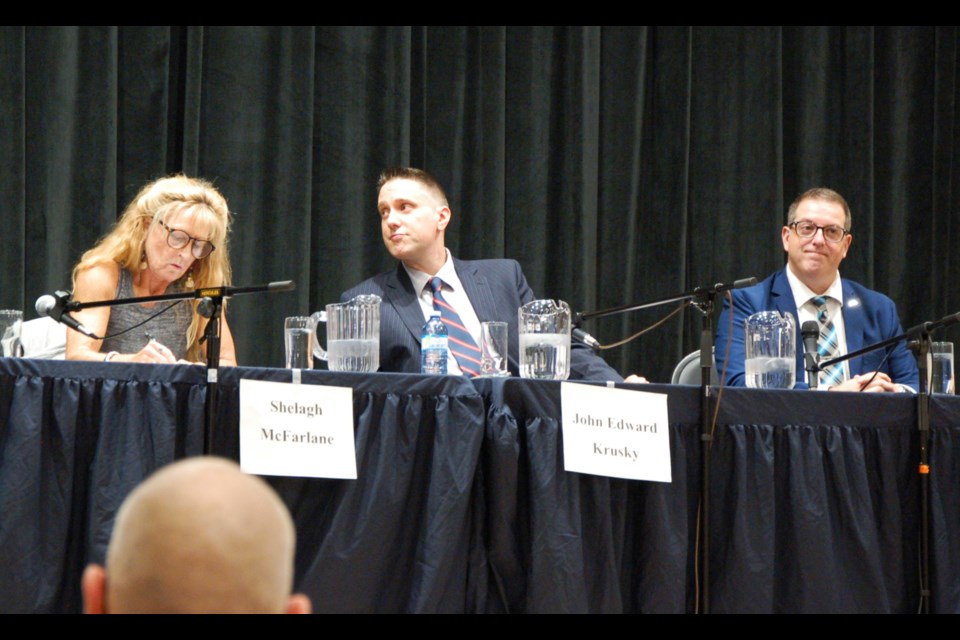The rising cost of living emerged as a major theme in a candidates debate hosted by residents of Village by the Arboretum on Thursday afternoon, which focused on the mayoral and Ward 5 contests.
Many of the questions posed were either directly related to the increased cost of housing, living expenses and water, or were tied back to those subjects through candidate responses.
A recording of the debate was uploaded to YouTube.
Residents of the private seniors community off Stone Road voiced concern about homelessness, need for mental health services and less expensive downtown parking, as well as the presence of racism and homophobia in the city.
“I believe we’ve come a long way together as a community,” said incumbent mayoral candidate Cam Guthrie, pointing to three years of decreased crime severity index rankings and the development of master plans intended to guide population growth and city services in the years to come, adding he’s “frustrated” by the affordability crisis that’s currently playing out. “We have more work to do on those things.”
John Edward Krusky, who’s also seeking the mayor’s chair on Oct. 24, laid some of the blame for increasing living costs on the federal government.
“I’m very dissatisfied with the cost of living in this country and I do not see strong federal leadership that is addressing this,” he said. “I see higher taxes, I see households that are struggling.”
There was a 50 per cent candidate turnout for the afternoon event, with three of six people in attendance seeking the mayor’s chair and the same for Ward 5’s two councillor seats.
Speaking directly to the issue of housing affordability, Krusky said developers alone can’t be counted on to build housing people consider affordable.
“There is a point to where supply can exceed demand. And once you have more housing available … and there isn’t demand for that housing, the price of housing drops. This is something that is not in the interest of the private sector to address because they cannot get the optimal prices for real estate,” he said. “It requires Crown corporations to actually get involved in our economy and to create ample housing.”
He’d like to see supply that exceeds demand in Guelph in order to “show other Canadian municipalities how to do that and how to lead by example.”
The housing crisis is nation-wide, Guthrie stated.
“Guelph needs to step up,” he said, calling for more infill developments and accessory living units throughout the city. “Housing must be done through the whole continuum – supportive housing, affordable, subsidized affordable, market rent, market ownership. We need to address all of that housing issue as quickly as possible.”
That means working with the private sector and other levels of government, Guthrie noted.
As she did in several responses throughout the event, aspiring mayor Shelagh McFarlane pointed to her desired changes in the structure of municipal government, calling on elected officials to work for the people rather than in the best interest of corporations and global organizations.
“We have no local political representative officials because they all now work and are incorporated into the service corporations that are supposed to be providing services. It seems like now though they are running the services,” she said. “That needs to stop or we’re not going to have local funds available for issues like homelessness, etcetera.”
Part of addressing cost of living concerns is managing provincially mandated growth, stated Ward 5 incumbent candidate Leanne Caron, who will be identified on ballots as Leanne Caron Piper. Growth puts pressure on infrastructure, impacts air quality and traffic volumes as well as the urban forest, she said.
“Affordability isn’t just about housing. Affordability is about being able to afford the utilities to operate your home and fuel for your car, transportation and all the other things that contribute to quality of life,” she said. “We can’t be focused entirely on just build, build, build.
“We need the challenges of growth to be managed strategically.”
The city currently has nearly 145,000 residents and is mandated to grow to 203,000 by 2051, though a motion of council seeks to increase that number to 208,000 in light of the 2021 annexation of the Dolime Quarry lands and planned development there.
“If we try to build faster than (the city’s growth strategy outlines), then it puts a tax burden, a cost of everyone else in the community,” commented incumbent Ward 5 candidate Cathy Downer.
“Growth does not pay for itself,” she added, noting denied planning applications often end up in front of the Ontario Land Tribunal for an appeal decision. “It’s a concern that these decisions are being made outside of our community and we lose control over how we are going to see growth happen.”
Population growth is important for the city, added Ward 5 candidate Hesham Genidy, who suggested many of the negative impacts can be mitigated.
“No matter what, the city will have limited resources,” he said, calling on the municipality to employ new technologies to “help make it easier on everyone” and at the same time bring down city spending. “It will hopefully help to solve these issues.”
Event moderator Sya VanGeest explained organizers received regrets from mayoral candidates William Albabish and Danny Drew, but there was no response from Nicholas A. Ross.
Similarly, she said Ward 5 candidates Lana Haines and Denese Renaud let organizers know they were unable to attend, while the invitation to Alex Green went unanswered.
